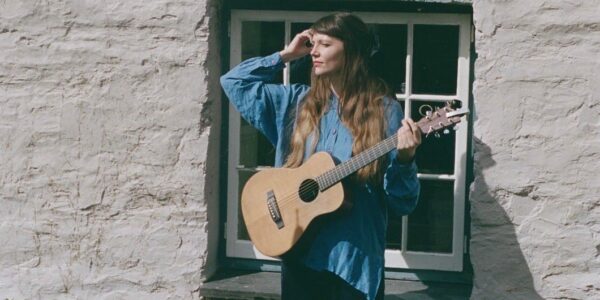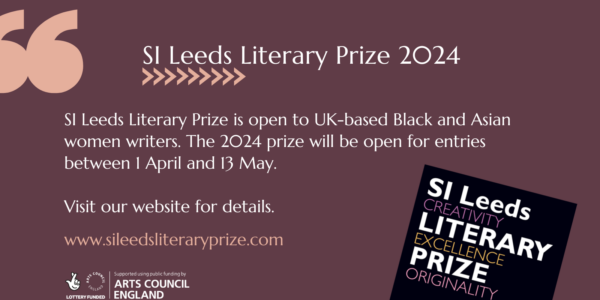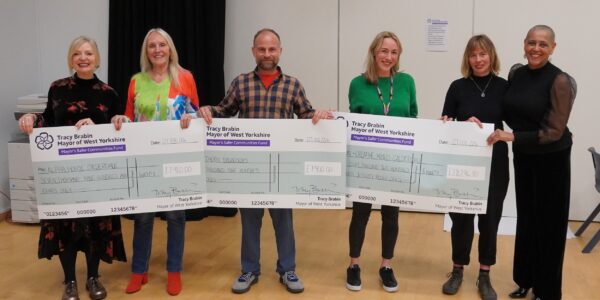Sarah Hall – The Stories We Tell
18 Dec 2019 / The Stories We Tell
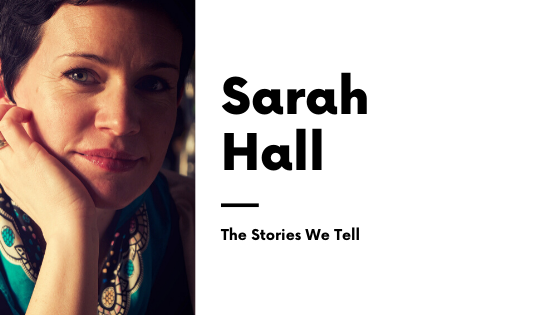
River Story
The other day, my daughter told me she wants to be a writer. She is currently learning to read and write, we were off to school, and she’d recently become aware of the job I do when she is not home. Mummy, I am going to make a storybook, she announced. Then, a bit less certain, How do I write it? Good question, I thought. Well, maybe I can learn in school, she said (school now being the hub of proper learning, rather than mummy). I was about to try to reply, when she let go of my hand and stopped on the pavement to rummage in a pile of leaves. After that she sniffed a patch of brick wall that looked peed on by a dog, examined a lost glittery glove, backtracked to interact with a solicitous cat, and squished some mud under her boot to make farty sounds – all with a kind of earnest, forensic, sensualist’s curiosity. I shifted her on, so as not to be late for the register, but was quite sorry to stop her experiencing this world.
When I was five, I did not know what I wanted to be. Are a writer’s tendencies inherent or do they develop in stages? I remember my school – an old Lakeland endowed building, surrounded by woods and fells. I remember stiff leather shoes in September, cold, damp outdoor loos, the smell of the library corner, custard skins, and the static plastic carpet that could be rubbed and electrically charged to give friends a little zapping shock. I remember biking over the steep moorland hills, the intoxicating smell of gorse blossom, and horse sweat, hay, mineral rains, peat, bright dying bracken, a kind of native earthy aroma.
I particularly remember spending long cool hours in the river next to my parents’ cottage: swimming through the reeds and between boulders; dipping down and peering into an underwater world – for the river contained planetary life, environments, foliage, houses, crustation roads and beaches, populations (eels, minnows, trout, crayfish) benthic weather, and light systems. The river was a narrative, free and story-less, or a perpetual story. While I was in it, it just happened and kept happening. It was utterly occupying, immersive. There’s a particular, corrupt river fragrance that I adore, of trout, pebble, algae, silage, weed, silt, risen, rained-into and reservoired water – I’ve never managed an exact description.
What’s my point? Can I say the river, with its sensualities, its arbitrary flow and endless detail, its lack of a true beginning, middle and end, inspired a desire to write, influenced me, or made me (begin to become) a harnesser of other worlds?
So, what is a story? Isn’t a story just a narrative quality, an amorphous thing? This may seem strange for a fiction writer to propose, and perhaps I’m atypical. Lots of writers pre-plan, feel the need to enclose, focus first and foremost on plot and structure. When we think of fiction, novels, short stories, the finished articles, do we always think of definition and shape first? Word length, chapters, shape, genre, pace, plot, and within this, events, dramas, characters, landscapes, intrigues, evolutions? Or do we think of spirit, matter, atmosphere; its essence and sense? I’ve always regarded the ‘machinery’ of a book as its most artificial aspect, and secondary to an organic and possibly elementally dynamic heart or voice. For me, story is fluid, a stretch of something flowing, we choose to join it and leave it, and we choose its nature in its passing. This no doubt shows in my writing, and might be a failing, and it does not mean I don’t believe in rigorous editing. But it’s a mode that works for me, and we must find our own modes wherever possible, and work with them.
There is one fundamental question for fiction. What is the magic trick needed to make a reader believe, or ‘suspend disbelief’? What creates virtuality – physical, psychological, sensual – to get as close to establishing ‘truth’ or a true world as fiction can? It’s just the ability of best possible words to form simulacra, to activate the imagination, and create that temporary reverie. The river is transferred to the page, and the river on the page becomes the river of the reader’s mind and experience – the reader’s own phenomenological river.
To believe, we need a level of intellectual persuasion, of course, the draw of intrigue or provocation, life-like characters, and a somewhat supportive literary structure – other writers write brilliantly about these aspects. Mostly, I think, a reader needs to feel they are in that other world, to be transported by and into the experience of it. The worlds of fiction must facilitate human connectivity: corporeal, emotional, political, whatever.
The best fiction writers have a poet’s understanding of and dimensionality with words, in order to get all that done – what Jamie McKendrick describes as sky nails ‘that will nail anything to nothing and make it stay.’ An excellent level of language is, I believe, key in creating truly immersive, believable fiction. It might be plain language, it might be florid, or something in between, but it has to be right, accurate, evocative, tonal, incantatory, replicative, various, mindful, promissory. As a reader, I struggle with even mediocre levels of language in fiction – if I can’t really believe what I am reading at the level of material words, my mind doesn’t fire, and I can’t continue to read. Language is fiction’s fundamental scaffolding, its animate dna. Stories that I remember, that I love, are stories where lines within have seemed so absolute that I can still quote them, or the essence of the book’s world has been so effective that I lived the story, the story lived in me.
How are those words, the details and the spirits found? I think my daughter must know, because children do know – they examine, they are immersed little beings, their imaginations frequently overtake them, they live in other worlds and believe those worlds while understanding simultaneously the invention; they are bodily aware and cognitively very receptive. So, to make a ‘storybook’: observe. Notice details. Be open: a sensualist. Then find a communicative transference; define in a way that represents quality and meaning, select and reselect cyphers (words). Imagine all the rest, but imagine it hard and properly: those other composite experiences and observances allow for un-experienced versions to be created – and in this way we are oceanically free as writers. It is possible to say that alongside atoms, facts, reality, the world is made of our stories anyway, experiences, perceptions, versions, formulations.
I am often asked what has inspired a work of fiction – which other works of fiction, for example. When I say, it’s the smell of gorse, or the huge cold muscles of the lake, or music, or a piece of art, or people, their stories and behaviours, I might sound like an odd practitioner who doesn’t like many books (busted). When I say – it’s the river, it’s standing in the water, letting it come, feeling it, letting it pass, trying to say from this moment to that moment there’s a world, narrative consciousness, un-sculptable but somewhat shaped, dynamic – I am telling the truth. Perhaps I never grew up. Fiction writing is child-like, playful and possibly silly, but it’s also extraordinarily earnest, and requires utter attentiveness and craft – committed acts of virtuality. At best, it can seem more truthful than any other form of art. At best, and convincingly, it is the river.
Find out more about The Stories We Tell.
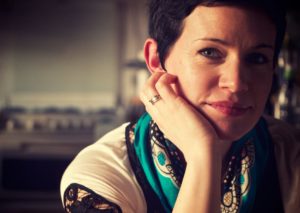 Sarah Hall has published five novels and three short story collections, the latest of which is called Sudden Traveller. Among other prizes, she has received the BBC National Short Story Award, an E. M. Forster Award, The Portico Prize and John Llewellyn Rhys Prize, and she has been twice nominated for the Man Booker Prize. She is a Fellow of the Royal Society of Literature, and was named as one of Granta’s Best Young British Novelists in 2013. She has taught creative writing for a number of organisations including The Arvon Foundation, Faber Academy, and the Guardian, and she is a co-founder of Lycian Writers. Sarah was born in 1974 in Cumbria, and currently lives and works in Norfolk.
Sarah Hall has published five novels and three short story collections, the latest of which is called Sudden Traveller. Among other prizes, she has received the BBC National Short Story Award, an E. M. Forster Award, The Portico Prize and John Llewellyn Rhys Prize, and she has been twice nominated for the Man Booker Prize. She is a Fellow of the Royal Society of Literature, and was named as one of Granta’s Best Young British Novelists in 2013. She has taught creative writing for a number of organisations including The Arvon Foundation, Faber Academy, and the Guardian, and she is a co-founder of Lycian Writers. Sarah was born in 1974 in Cumbria, and currently lives and works in Norfolk.
